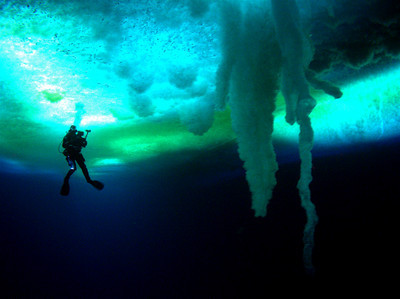“Encounters at the End of the World”
A good movie -- at least according to the late, great Alfred Hitchcock -- takes you somewhere you've never been before.
Words to live by, according to the great -- and very much alive -- Werner Herzog.
From the Alaskan wilderness ("Grizzly Man") to the Amazon ("Aguirre, the Wrath of God") to the Laotian jungle ("Rescue Dawn"), Herzog has roamed the globe in search of otherworldly images -- and the extraordinary people driven to explore these extremes.
Including, and sometimes especially, Herzog himself.
In the documentary "Encounters at the End of the World," Herzog heads to the ends of the Earth -- at the invitation of the National Science Foundation -- to focus on Antarctica.
And, by extension, on some of the thousand or so people -- from physicists to plumbers, biologists to bus drivers -- who live and work in a world where the ice is often as blue as the sky.
"If you take everyone who's not tied down, they fall to the bottom of the planet," explains computer expert William Jirsa -- a linguist on a continent with no language.
There's the plumber who claims royal Aztec ancestors. The Colorado banker who became a Peace Corps volunteer in Guatemala, then a bus driver of a giant vehicle dubbed "Ivan the Terra Bus."
Along with the philosophical forklift driver who, inspired by his grandmother's bedtime recounting of "The Odyssey," wanted to "jump off the margin of the map."
Clearly, he's come to the right place.
The documentary's astounding landscape begins and ends with vast expanses of dazzling ice -- but includes towering glaciers and icebergs, mist-covered mountains, volcanoes belching fiery magma and ghostly underwater caverns resembling cathedrals capped by frozen vaulted ceilings. (These vistas prove a perfect antidote for us heat-withered locals struggling to survive another summer in triple-digit hell.)
Yet, thanks to Herzog's idiosyncratic viewpoint, such postcard-worthy wonders sometimes prove less striking than the utterly prosaic McMurdo Station base camp, which reminds Herzog -- who provides the documentary's dry, deadpan narration -- of "an ugly mining town filled with Caterpillars and construction sites."
There's also a dessert outpost that provides icebound workers with frozen treats. A nondescript building that hides a greenhouse abloom with hardy vegetation. And a bleak, Motel 6-style dormitory with hallways that disguise the fact that "behind every door, there's someone with a special story to tell."
If there's anybody who can get those folks to spill their special stories, it's Herzog, a kindred spirit who gravitates to life on the edge as a path to understanding. (With "Encounters at the End of the World," Herzog has now filmed features on all seven continents.)
For starters, there's the computer expert who once rode a garbage truck from London to Nairobi -- and hitchhiked from Denver to Bolivia, spending much of the journey inside a sewer pipe. Her main claim to fame: She can fold herself inside a carry-on suitcase -- and demonstrates exactly that during a McMurdo talent night.
Away from the base, Herzog visits researchers who analyze seal milk, hoping to find clues that could help humans lose weight. A University of Hawaii physicist explains -- or tries to, anyway -- a search for subatomic particles present at the creation of the universe, a search he likens to "measuring the spirit world."
A marine ecologist who's spent his career tracking penguins (and avoiding human conversation) speculates on the birds' capacity for inexplicable behavior. And when one penguin wanders away from the sea, toward the mountains -- and certain death -- Herzog asks the inevitable, unavoidable question: "But why?"
Even when Herzog doesn't ask it out loud, that question haunts "Encounters at the End of the World."
And the answers he elicits include the inescapable realization that the documentary's title doesn't refer exclusively to its South Pole setting.
Especially when Herzog includes the scientists' views on global warming, noting that "many of them agree the end of human life on this planet is assured" -- and that, just as the dinosaurs disappeared, "we seem to be next."
If we are, it won't be because we didn't have any warning.
Yet unlike some sound-the-alarm documentaries with a more overt political agenda, "Encounters at the End of the World" takes after its creator, who allows his extraordinary subjects -- human and otherwise -- to speak for themselves. And, perhaps, for all of us.
Contact movie critic Carol Cling at ccling@reviewjournal.com or 702-383-0272.
REVIEW
movie: "Encounters at the End of the World"
running time: 99 minutes
rating: G
verdict: B+
now playing: Village Square
DEJA VIEW
Filmmaker Werner Herzog explores extremes in both documentary and fictional features. A few of his best:
"Aguirre, the Wrath of God" (1972) -- On a quest for gold, a ruthless conquistador (Klaus Kinski) leads his troops deep into the Amazon jungle.
"Fitzcarraldo" (1982) -- Herzog and Kinski reunite for an epic (the focus of Les Blank's documentary "Burden of Dreams") about a music-loving rubber baron's attempts to build an opera house in the Peruvian jungle.
"Lessons of Darkness" (1992) -- A haunting account of the burning of the Kuwaiti oil fields in the aftermath of the Gulf War.
"Grizzly Man" (2005) -- The life and death of amateur wildlife advocate Timothy Treadwell, who lived among Alaska's grizzly bears for 13 years -- until he was mauled and devoured by one.
"Rescue Dawn" (2006) -- Fictionalized remake of the documentary "Little Dieter Needs to Fly," about a captured Vietnam War pilot (Christian Bale) who escapes a POW camp -- and endures a harrowing jungle ordeal.
-- By CAROL CLING














